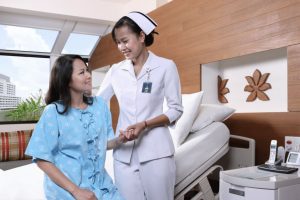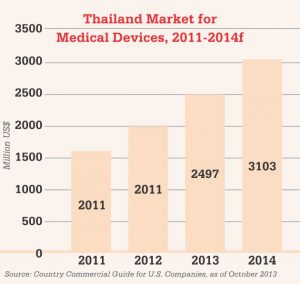The Thai pharmaceutical market, valued at $4 billion in 2012, is the largest in Southeast Asia. By 2020, this value is expected to increase to $9 billion.
The Thai economy is the world’s 20th largest by GDP at PPP and the 27th largest by nominal GDP and became a newly industrialized country and a major exporter in the 1990s. Manufacturing, agriculture, and tourism are leading sectors of the economy.
Formerly known as Siam, the Kingdom of Thailand is a country at the center of the Indochinese peninsula in Southeast Asia. With a total area of approximately 513,000 sq km (198,000 sq mi), Thailand is the world’s 50th-largest country. It is the 20th-most-populous country in the world, with around 69 million people.
Thailand is a constitutional monarchy and has switched between parliamentary democracy and military junta for decades, the latest coup being in May 2014 by the National Council for Peace and Order. Its capital and most populous city is Bangkok. Myanmar and Laos border it to the north, to the east by Laos and Cambodia, to the south by the Gulf of Thailand and Malaysia, and to the west by the Andaman Sea and the southern extremity of Myanmar. Its maritime boundaries include Vietnam in the Gulf of Thailand to the southeast, and Indonesia and India on the Andaman Sea to the southwest.
The Thai economy is the world’s 20th largest by GDP at PPP and the 27th largest by nominal GDP. It became a newly industrialized country and a major exporter in the 1990s. Manufacturing, agriculture, and tourism are leading sectors of the economy. It is considered a middle power in the region and around the world.
Medical tourism hub
With a high quality of medical services and affordable prices, Thailand has become a major hub for medical tourism in Asia. Thailand’s facilities, technologies, quality of medical services and expertise all factor in to attract healthcare services of medical devices, pharmaceuticals and medical food.
The country offers state of the art facilities and technologies, internationally certified medical services, excellent medical expertise, highly qualified medical professionals and a wide range of high standard hospitals. Thailand has a significant number of internationally accredited medical facilities.
 In order to develop Thailand into an ‘International Health Center for Excellence’, the Ministry of Public Health, the national focal point for implementation of the Medical Hub Policy, recently executed its second strategic plan (2012 – 2016). The plan encompasses four major areas: medical services, integrative wellness centers, development of Thai herbs and traditional and alternative Thai medicines.
In order to develop Thailand into an ‘International Health Center for Excellence’, the Ministry of Public Health, the national focal point for implementation of the Medical Hub Policy, recently executed its second strategic plan (2012 – 2016). The plan encompasses four major areas: medical services, integrative wellness centers, development of Thai herbs and traditional and alternative Thai medicines.
Thailand is one of the world’s largest medical tourism markets, with the number of international patients continuing to rise. According Ministry of Public Health and the Kasikorn Research Center, Thailand welcomed more than 2.5 million international patients in 2012, a 13 per cent increase from 2011. Thailand’s 2012 revenue from medical tourism was between $4.0 billion and $4.7 billion, up from $3.2 billion in 2011.
Thailand also attracts thousands of international patients with its traditional and alternative medicines. Alternative medicine uses herbal medicines, biofeedback, and acupuncture in lieu of drugs. A broad range of practices is used including homeopathy, naturopathy, chiropractic and acupuncture. The Thailand Public Health Ministry has formally supported the field in an effort to promote Thai traditional and alternative medicines in hospitals nationwide.
The initiatives that Thailand has undertaken to strengthen its position as the medical hub of Asia have created opportunities for continued growth in related fields, including the medical services, medical device and pharmaceutical sectors. As a result, Thailand has become an excellent location for investment.
Medical technology sector
Thailand emerged as a leading medical tourism destination because of its robust medical services sector. Millions of medical tourists from all over the world are drawn to the country by its high-quality internationally certified medical services, cutting-edge medical equipment, and experienced physicians at affordable prices.
Thailand offers world-class medical facilities. Thai hospitals are among the best in Asia to be Joint Commission International (JCI) accredited. Thai Hospitals also offer advanced medical equipment such as Picture Archiving and Communication Systems (PACS). These systems provide a wide range of imaging services, including radiotherapy, CT and MRI scans angiography, cardiology, fluoroscopy, ultrasounds, dental imaging and mammography. The images are stored in the hospital’s network, and doctors can access the data anywhere in the hospital. Additionally, the Cyber Knife Robotic Radiosurgery System is an alternative treatment for tumors. The Cyber Knife treatment involves delivering beams of high dose radiation to tumors with extreme accuracy while also being pain-free.
International patients visit Thailand for a variety of treatments including general check-ups, dentistry, cancer treatments and so on. The price of surgery services in Thailand is far lower than the price of similar procedures in the USA or Europe. Thailand also narrowly edges out Singapore in surgery price comparisons, contributing to the country’s domination in the global medical tourism market.
In addition to Thailand’s competitive pricing, the country’s high standards and quality care contribute to its market success. Thai private hospitals rank among the highest in healthcare and nursing standards.
Domestic manufacturing
The Thai government’s continued efforts to develop the country into an Asian medical hub have driven demand of medical services and devices. Although a wide range of medical devices area manufactured domestically. Thailand still relies heavily on imported medical devices, especially sophisticated and higher-end devices. This backdrop centers an opportunity for new investment in high-end medical device manufacturing in Thailand.
 Increased demand in the healthcare market is a key driver of the Thai medical device industry. As Thailand’s universal healthcare system continues to develop, demand for medical devices and services is likely to increase as well. .
Increased demand in the healthcare market is a key driver of the Thai medical device industry. As Thailand’s universal healthcare system continues to develop, demand for medical devices and services is likely to increase as well. .
According to the chart above, the market for medical devices has strongly grown. In 2012, the market for medical devices in Thailand was $2 billion, a 2.4 per cent increase from the previous year. The market is predicted to reach $2.5 billion and $3 billion in 2013 and 2014, respectively.
Many leading medical device companies invest in Thailand because of the country’s high market growth potential, abundance of raw materials, skilled and affordable labor, excellent infrastructure, advanced production technology and high-control standards. Additionally, the government offers attractive investment incentives for investment in the medical device sector.
“The Royal Thai government has placed a greater emphasis on the medical devices sector. Recently, the Royal Thai government announced a strategic plan to promote investment, research and development for medical devices in order to increase local production and reduce reliance on imports.
“The Thai medical sector has seen robust and consistent growth owing to national health insurance schemes; a medical tourism policy and the strategic government plan to develop Thailand as a Medical Hub of ASEAN. These factors create great opportunities for investment, R&D and the expansion of medical device production in Thailand,” notes Preecha Bhandtivej, President of Thai Medical Device Technology Industry Association.














